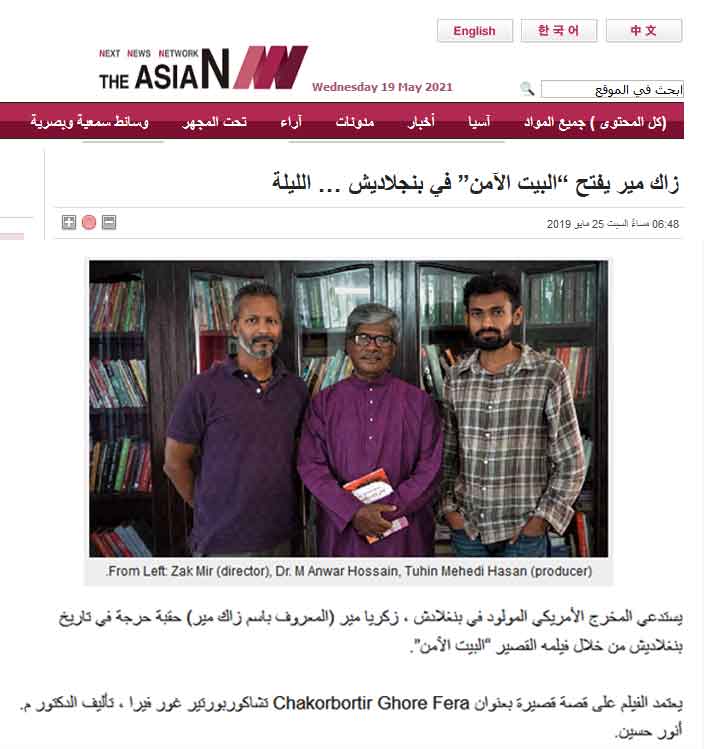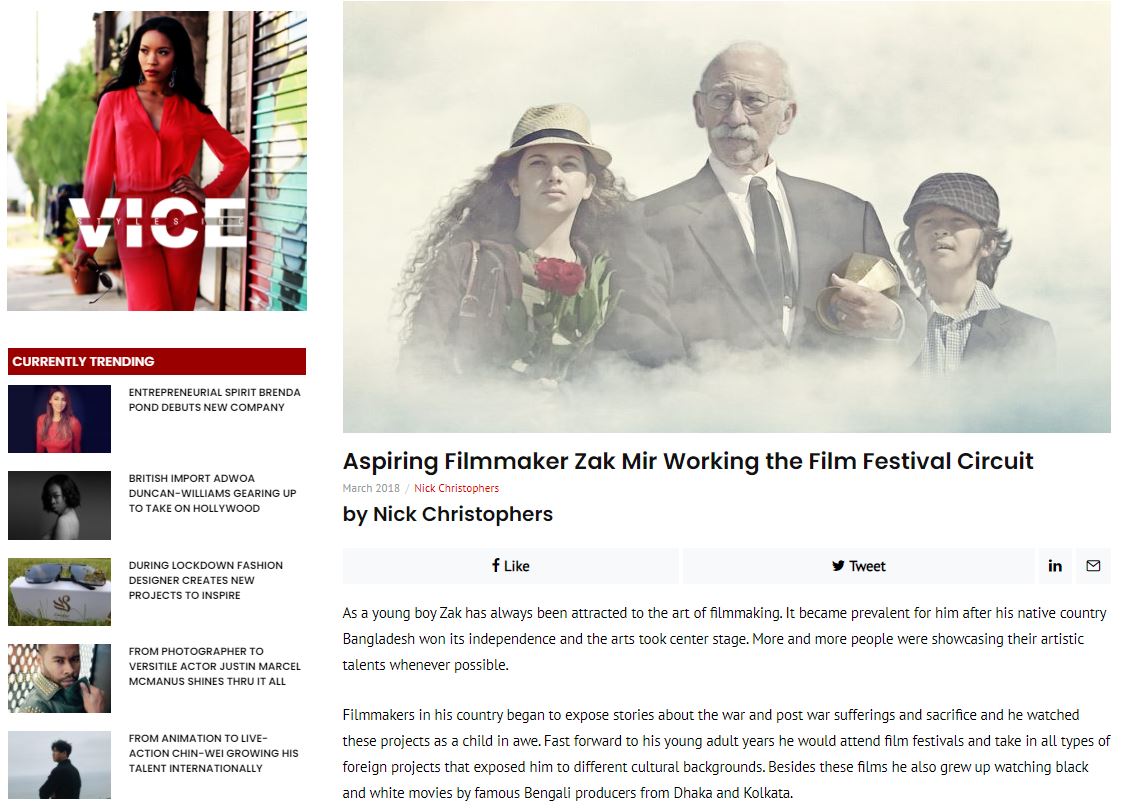Article on Ode To An Urn in Life Style Republic Magazine – March 2018
As a young boy Zak has always been attracted to the art of filmmaking. It became prevalent for him after his native country Bangladesh won its independence and the arts took center stage. More and more people were showcasing their artistic talents whenever possible. Filmmakers in his country began to expose stories about the war and post war sufferings and sacrifice and he watched these projects as a child in awe. Fast forward to his young adult years he would attend film festivals and take in all types of foreign projects that exposed him to different cultural backgrounds. Besides these films he also grew up watching black and white movies by famous Bengali producers from Dhaka and Kolkata. Read More
View MoreOde to an Urn on TV
In this TV program on Kazan International Film Festival of the Muslim World; author, journalist, Ashraf Aboul-Yazid Ashraf-Dali talks about Ode to an urn. “You need to admit you have a problem to seek solutions. There was a Bangladeshi filmmaker, Zakaria Mir, or Zak Mir, who emigrated to USA and directed his film on two young gypsies; a girl and her brother being homeless who roam the country to beg by playing music on violin and harmonica, a man helps them and hosts them at his home. He had a jar full of the remaining dust of his late wife. When these two guests dropped the jar and spread its content on the ground. He becomes angry and sends them out. After becoming calm again, he begins the journey of searching for the displaced little ones to share him in potting the remains in the river or in the ocean. This Bangladeshi filmmaker traveled abroad carrying his issues, issues of poverty, themes of death, human values, being loyalty to our beloved late ones, the ceremonies, even the idea of keeping dust of a body in a jar, the ashes of the late woman, is a common Asian- related culture known more than it is an Islamic or an American tradition. So, he traveled with his multi cultures world and applied them in an American film, and had it contributing in the festival. This means that human issues could be touching all. Geography is melted, history is focused differently. Video || Read More
View MoreThe safe house is not safe
Exploring the dark chapters of military coups and counter-coups
While the opposition BNP silently observes the 84th anniversary of its founder General Ziaur Rahman, M Anwar Hossain, a professor of Dhaka University, recollects his illegal detention at a nondescript “safe house” in Dhaka Cantonment 45 years ago, accused of conspiracy against the state with an intention to overthrow a legitimate government of General Ziaur Rahman. After seven years, I was also thrown into the dark dungeon of an undisclosed “safe house” in a different location in Rangamati. I was a young reporter working for an English newspaper, The New Nation, in 1982. Read More
View MoreDr. Anwar Hossain Interview || زاك مير يفتح “البيت الآمن” في بنجلاديش … الليلة
يستدعي المخرج الأمريكي المولود في بنغلادش ، زكريا مير (المعروف باسم زاك مير) حقبة حرجة في تاريخ بنغلاديش من خلال فيلمه القصير “البيت الآمن”.
يعتمد الفيلم على قصة قصيرة بعنوان Chakorbortir Ghore Fera تشاكوربورتير غور فيرا ، تأليف الدكتور م. أنور حسين.
يستعرض الفيلم ، من وجهة نظر مدرس جامعي محتجز لفترة وجيزة حياة صبي هندوسي شاب يدعى تشاكروبورتي ، تم احتجازه أيضًا لاستجوابه في منشأة تدعى “البيت الآمن”. وهو متهم بأنه جاسوس هندي.
على الرغم من أن القصة تمتد عبر فترة زمنية قصيرة ، إلا أننا نتعرف على العلاقة بين السجناء وثقتهم ببعضهم البعض وتعاطفهم. في حبكة إنسانية ومؤثرة.
عند اختيار المواقع الضيقة والخانقة في بعض الأحيان ، يحاول المخرج تقريب الجمهور قدر الإمكان من الشخصيات دون جعلهم غير مرتاحين أو وضعهم على حافة مقاعدهم خاصة أثناء مشاهد التعذيب. يقول زاك: “كانت بعض هذه المشاهد ضرورية” للإبقاء بصدق على خطوط القصة الأصلية.
تسليط الضوء في الغالب على الطبيعة المظلمة للقصة في الفيلم ، باستخدام تقنية الإضاءة الخاصة وزوايا الكاميرا ، ويعزى الفضل في ذلك إلى مدير التصوير ، نفيد خان شودري.


